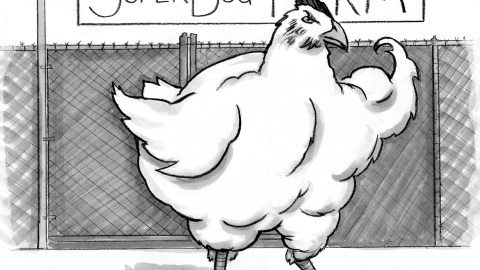How Many Deaths Is Cheap Chicken Worth?

1. If you want to be a good boss you will want regulation (likewise good economists). If that surprises you, Maryn McKenna’s book Big Chicken shows you’ve caught a virulent strain of bad ideas about business.
2. McKenna’s meaty history shows “how antibiotics created modern agriculture” but also antibiotic-resistant superbugs (our prevailing pecking order puts profit above deadly risks).
3. ~40,000 deaths + 6,000,000 UTIs arise annually from food-borne, factory-farm born, superbugs.
4. In 1948 antibiotics became livestock “growth promoters” (~10% heavier birds without extra feed).
5. Before 1945 scientists knew ill-suited antibiotic use would breed resistant bacteria—eradicating easy-to-kill kinds clears space for hardier bugs to evolve and thrive (livestock now consume ~80% all antibiotics).
6. In cleanly kept healthy animals growth promoters have little effect (likely work by counter unhealthy deficiencies, like being cooped up in poop-laden enclosures).
7. Yet most players prioritized short-term profit (dodging growth-promoter bans by reclassifying antibiotics as preventive, to continue unscrupulous unhygienic overcrowding).
8. Consider now-popular “free market” ideas. Did voluntary transactions self-organize well? Did businesses behave responsibly? Did bad choices harm only bad choosers? If not then, why now?
9. Not choosing industrialized meat is no defense (e.g., meat-plant bugs spread to a hospital infecting 4,000 newborns killing 24 mothers and infants). We inhabit a microbial commons, rife with “tragedy of the commons” risks.
10. Can we afford to remain oblivious to the obvious? Isn’t it clear that, as in sports, if all players aren’t held to decent standards, good guys lose to prepared-to-cut-corners folks? Unregulated games can become “scoundrel cascades,” where race-to-the-bottom pressures push decent players to match the worst sins to stay in the game.
11. Doesn’t history routinely refute free-market fan self-regulation fantasies? Tobacco, banking, cars, pharma, processed foods… etc. Why trust businesses to do the right thing now?
12. Here cost-benefit-style thinking misleads—how many deaths is cheap chicken worth? 40,000+ annually? Well “markets” have already “decided” that, while risking millions more deaths (post-antibiotic era plagues).
13. In every market externalizing costs increases profits. Handling such dysfunctional incentives is hampered by an unhealthy alliance between backseat-driver theorizing economists and opportunistic bad businesses (—>”How Economists Turned Corporations into Predators”).
14. It’s an amazing case of sophisticated-seeming abstractions creating concrete stupidity. It’s far from the only “free market” example (e.g. claiming corporate taxes hinder growth, while actual “good” entrepreneurs testify not). Garrett Harding complained some economists sprinkle ideas such as “externality” like “pixie dust” before reverting to reality-denying toy-model math-ogling games.
15. Interestingly, my opponents on regulation are often also correct (—>3 regulation resistor types). Many bad counterproductive regulations exist. But that means we must consider the concrete particulars, not abstract idealizations like “permission-less innovation.”
16. Running a good (decent, effective, unharmful) business requires level-playing-field regulations
17. With great opportunity comes great responsibility. And great temptations. Are business titans immune to bias? Rationalization? Hubris?
18. With all the powerful do (public or private) we must “trust, but verify,” deploying balance-of-powers logic (—>Good versus Bad Rich).
Illustration by Julia Suits, The New Yorker cartoonist & author of The Extraordinary Catalog of Peculiar Inventions





